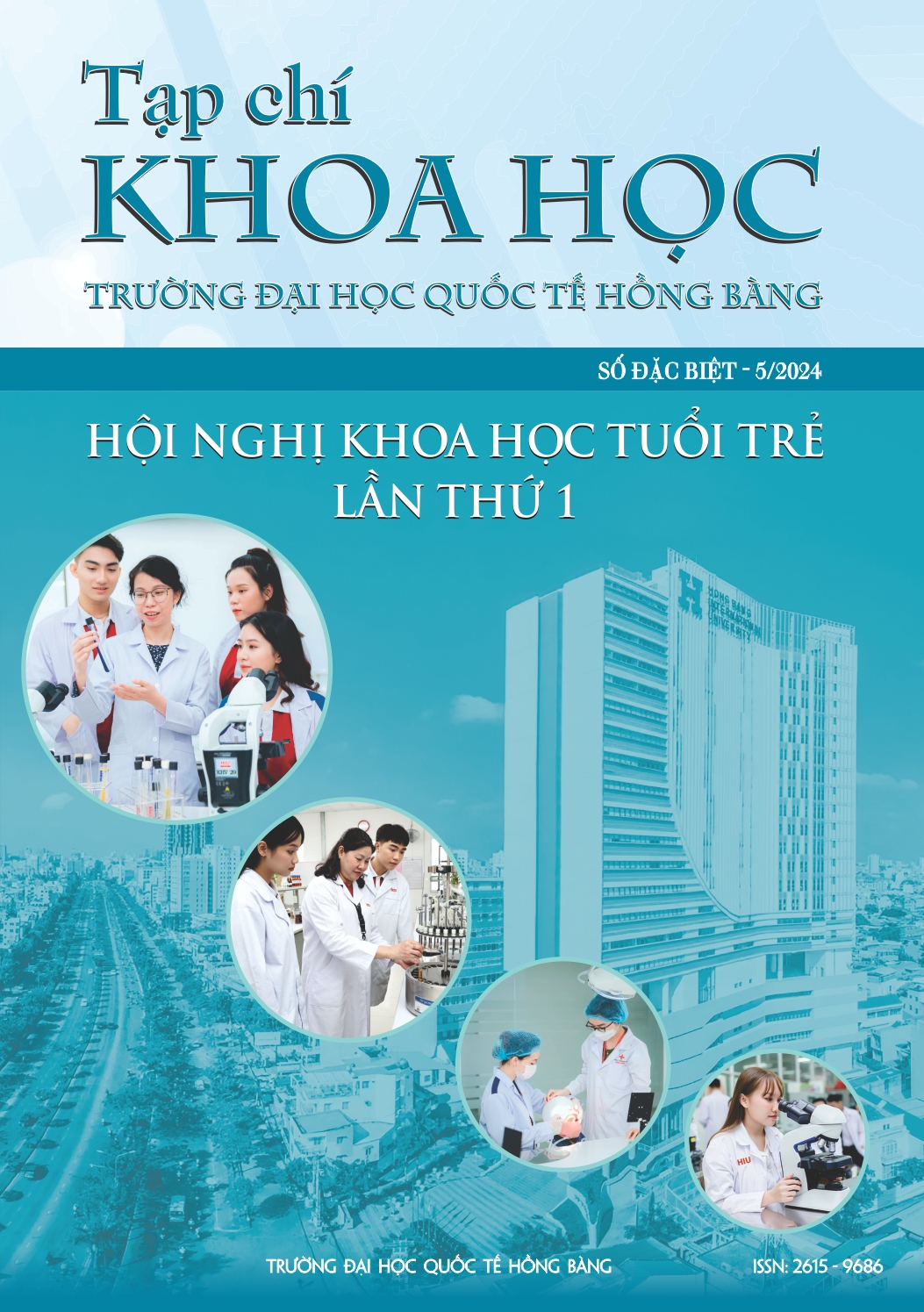MỐI LIÊN QUAN GIỮA METS-IR VÀ MỘT SỐ ĐẶC ĐIỂM TRÊN BỆNH NHÂN NHỒI MÁU CƠ TIM CẤP KHÔNG ĐÁI THÁO ĐƯỜNG
Các tác giả
DOI: https://doi.org/10.59294/HIUJS.KHTT.2024.006Từ khóa:
nhồi máu cơ tim cấp, không đái tháo đường, đề kháng insulin, METS-IRTóm tắt
Đặt vấn đề: Đề kháng insulin là một dấu hiệu của sự bất thường về chuyển hóa, không chỉ góp phần vào cơ chế bệnh sinh của các bệnh tim mạch mà còn tương quan đáng kể với các biến cố tim mạch bất lợi. METS-IR (Metabolic score for insulin resistance) được xem là một chỉ số mới không sử dụng insulin để đánh giá đề kháng insulin. Mục tiêu nghiên cứu: Xác định giá trị của chỉ số METS-IR và mối liên quan giữa METS-IR với một số đặc điểm trên bệnh nhân nhồi máu cơ tim cấp không đái tháo đường. Đối tượng và phương pháp nghiên cứu: Nghiên cứu trên 168 bệnh nhân nhồi máu cơ tim cấp, không đái tháo đường nhập viện tại Khoa Tim mạch can thiệp, Bệnh viện Nhân dân 115. Kết quả: Giá trị trung bình của METS-IR là 36.96 ± 6.02, ghi nhận sự khác biệt có ý nghĩa thống kê với p < 0.05 về tuổi, chỉ số khối cơ thể, tỷ lệ thừa cân béo phì, nồng độ nonHDL-C và một số tỷ số lipid trong ba nhóm theo tam phân vị của METS-IR. Kết luận: METS-IR là một chỉ số mới đơn giản, dễ thực hiện gián tiếp đánh giá tình trạng đề kháng insulin ở những người có nguy cơ mắc các bệnh tim mạch cũng như rủi ro mắc các biến cố tim mạch bất lợi trên bệnh nhân bị nhồi máu cơ tim cấp.
Abstract
Background: Insulin resistance is a marker of metabolic abnormalities that not only contributes to the pathogenesis of cardiovascular diseases but also significantly correlates with major adverse cardiovascular events (MACEs). METS-IR (Metabolic score for insulin resistance) is considered a novel non-insulin index to assess insulin resistance. Objectives: Determine the value of the METS-IR index and the relationship between METS-IR and some characteristics in non-diabetic acute myocardial infarction patients. Subjects and methods: Study on 168 patients with acute myocardial infarction, non-diabetic, hospitalized at the Department of Interventional Cardiology of People's Hospital 115 from June to December 2023. Results: The mean value of METS-IR was 36.96 ± 6.02. Dividing the study subjects into 3 groups according to METS-IR tertiles recorded statistically significant differences between groups in age, Body mass index, overweight and obesity rate, nonHDL- C and some lipid ratios (p < 0.05). Conclusion: METS-IR is a new simple, easy-to-implement index that indirectly assesses insulin resistance in people at risk of cardiovascular diseases as well as the risk of major adverse cardiovascular events in people with acute myocardial infarction.
Tài liệu tham khảo
[1] N. Salari, F. Morddarvanjoghi, A. Abdolmaleki... M. Mohammadi, "The global prevalence of myocardial infarction: a systematic review and meta-analysis," BMC Cardiovascular Disorders, Vol. 23, No. 1, p. 206, 2023.
DOI: https://doi.org/10.1186/s12872-023-03231-w[2] O. Y. Bello-Chavolla, P. Almeda-Valdes, D. Gomez-Velasco… C. A. Aguilar-Salinas,"METS-IR, a novel score to evaluate insulin sensitivity, is predictive of visceral adiposity and incident type 2 diabetes," Eur J Endocrinol, Vol. 178, No. 5, pp. 533-544, 2018.
DOI: https://doi.org/10.1530/EJE-17-0883[3] Z. Wu, H. Cui, Y. Zhang… J. Yang, "The impact of the metabolic score for insulin resistance on cardiovascular disease: a 10-year follow-up cohort study," Journal of Endocrinological Investigation, Vol. 46, No. 3, pp. 523-533, 2023.
DOI: https://doi.org/10.1007/s40618-022-01925-0[4] J. Yoon, D. Jung, Y. Lee, and B. Park, "The Metabolic Score for Insulin Resistance (METS-IR) as a Predictor of Incident Ischemic Heart Disease: A Longitudinal Study among Korean without Diabetes," J Pers Med, Vol. 11, No. 8, 2021.
DOI: https://doi.org/10.3390/jpm11080742[5] Z. Wang, W. Li, J. Li, and N. Liu, "The Nonlinear Correlation Between a Novel Metabolic Score for Insulin Resistance and Subclinical Myocardial Injury in the General Population," Front Endocrinol (Lausanne), Vol. 13, p. 889379, 2022.
DOI: https://doi.org/10.3389/fendo.2022.889379[6] S. Zhang, Z. Wu, Y. Zhuang… J. Yang, "The metabolic score for insulin resistance in the prediction of major adverse cardiovascular events in patients after coronary artery bypass surgery: a multicenter retrospective cohort study," Diabetology & Metabolic Syndrome, Vol. 15, No. 1, p. 157, 2023.
DOI: https://doi.org/10.1186/s13098-023-01133-7[7] Z. Zhang, L. Zhao, Y. Lu, X. Meng, and X. Zhou, "Association between non-insulin-based insulin resistance indices and cardiovascular events in patients undergoing percutaneous coronary intervention: a retrospective study," Cardiovasc Diabetol, Vol. 22, No. 1, p. 161, 2023.
DOI: https://doi.org/10.1186/s12933-023-01898-1[8] Q. Hao, Z. Yuanyuan, and C. Lijuan, "The Prognostic Value of the Triglyceride Glucose Index in Patients With Acute Myocardial Infarction," J Cardiovasc Pharmacol Ther, Vol. 28, p. 10742484231181846, 2023.
DOI: https://doi.org/10.1177/10742484231181846[9] S. Gao, W. Ma, S. Huang, X. Lin, and M. Yu, "Impact of triglyceride-glucose index on long-term cardiovascular outcomes in patients with myocardial infarction with nonobstructive coronary arteries," Nutr Metab Cardiovasc Dis, Vol. 31, No. 11, pp. 3184-3192, 2021.
DOI: https://doi.org/10.1016/j.numecd.2021.07.027[10] X. Tian, Y. Zuo, S. Chen… A. Wang, "Triglyceride–glucose index is associated with the risk of myocardial infarction: an 11-year prospective study in the Kailuan cohort," Cardiovascular Diabetology, Vol. 20, No. 1, p. 19, 2021.
DOI: https://doi.org/10.1186/s12933-020-01210-5[11] W. Wongcharoen, S. Sutthiwutthichai, S. Gunaparn, and A. Phrommintikul, "Is non-HDL-cholesterol a better predictor of long-term outcome in patients after acute myocardial infarction compared to LDL-cholesterol? : a retrospective study," BMC Cardiovasc Disord, Vol. 17, no. 1, p. 10, 2017.
DOI: https://doi.org/10.1186/s12872-016-0450-9[12] M. I. Shved, I. O. Yastremska, and R. M. Ovsiichuk, "Correction of changes in lipid metabolism and redox system in patients with STEMI in the setting of insulin resistance," Art of Medicine, Vol. 25, no. 1, pp. 77-82, 2023.
DOI: https://doi.org/10.21802/artm.2023.1.25.77Tải xuống
Tải xuống: 152











